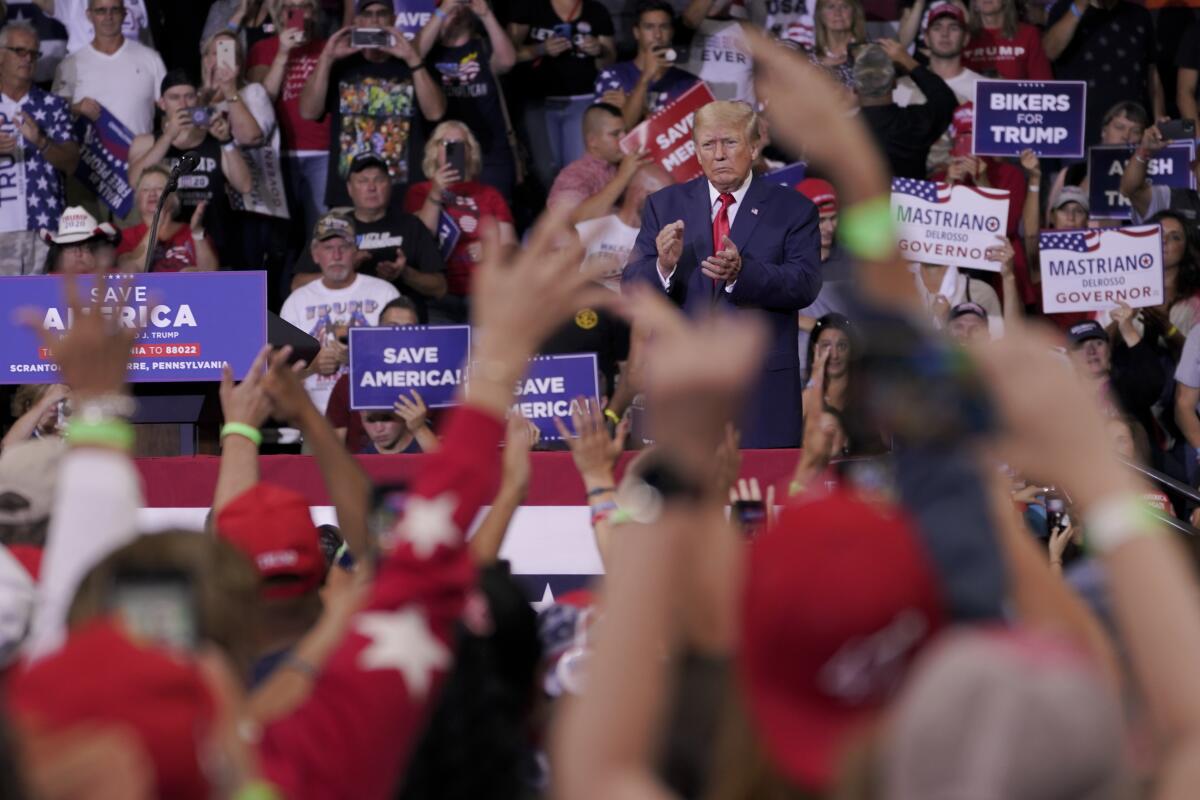Trump openly embraces, amplifies QAnon conspiracy theories

- Share via
After winking at QAnon for years, former President Trump is overtly embracing the baseless conspiracy theory, even as the number of frightening real-world events linked to it grows.
On Tuesday, using his Truth Social platform,Trump reposted an image of himself wearing a Q lapel pin overlaid with the words “The Storm is Coming.”
In QAnon lore, the “storm” refers to Trump’s final victory, when supposedly he will regain power and his opponents will be tried, and potentially executed, on live television.
As Trump contemplates another run for the presidency and has become increasingly assertive in the Republican primary process during the midterm elections, his actions show that, far from distancing himself from the political fringe, he is welcoming it.
He’s published dozens of recent QAnon-related posts, in contrast to 2020, when he claimed that while he didn’t know much about QAnon, he couldn’t disprove the conspiracy theory.
Pressed on QAnon theories that Trump allegedly is saving the nation from a
satanic cult of child sex traffickers, he claimed ignorance but asked, “Is that supposed to be a bad thing?”
“If I can help save the world from problems, I’m willing to do it,” Trump said.
Queen Elizabeth II’s funeral presents authorities with a huge security challenge, with millions of people and many dignitaries expected to turn out.
Trump’s posts have included images referring to himself as a martyr fighting criminals, psychopaths and the so-called deep state.
In one now-deleted post from August, he reposted a “q drop,” one of the cryptic message board postings that QAnon supporters claim come from an anonymous government worker with top secret clearance.
A Trump spokesperson did not respond to a request for comment.
Even when his posts haven’t referred to the conspiracy theory directly, Trump has amplified users who do. An Associated Press analysis found that of nearly 75 accounts he has reposted on his Truth Social profile in the last month, more than a third have promoted QAnon by sharing the movement’s slogans, videos or imagery. About 1 in 10 include QAnon language or links in their profile bios.
Earlier this month, Trump chose a QAnon song to close a rally in Pennsylvania. The song appears in one of his campaign videos and is titled “WWG1WGA,” a rallying cry for Q adherents that stands for “Where we go one, we go all.”
Online, Q adherents basked in Trump’s attention.
“Yup, haters!” wrote one commenter on an anonymous QAnon message board. “Trump re-truthed Q memes. And he’ll do it again, more and more of them, over and OVER, until (asterisk)everyone(asterisk) finally gets it. Make fun of us all you want, whatever! Soon Q will be everywhere!”
“Trump Sending a Clear Message Patriots,” a QAnon-linked account on Truth Social wrote. “He Re-Truthed This for a Reason.”
The former president may be seeking solidarity with his most loyal supporters at a time when he faces escalating investigations and potential challengers within his own party, according to Mia Bloom, a professor at Georgia State University who has studied QAnon and recently wrote a book about the group.
“These are people who have elevated Trump to messiah-like status, where only he can stop this cabal,” Bloom said. “That’s why you see so many images [in online QAnon spaces] of Trump as Jesus.”
On Truth Social, QAnon-affiliated accounts hail Trump as a hero and savior and vilify President Biden by comparing him to Adolf Hitler or the devil. When Trump shares the content, they congratulate one another. Some accounts proudly display how many times Trump has “re-truthed” them in their bios.
By using their own language to directly address QAnon supporters, Trump is telling them that they’ve been right all along and that he shares their secret mission, according to Janet McIntosh, an anthropologist at Brandeis University who has studied QAnon’s use of language and symbols.
It also allows Trump to endorse their beliefs and their hope for a violent uprising without expressly saying so, she said, citing his recent post about “the storm” as a particularly frightening example.
“The ‘storm is coming’ is shorthand for something really dark that he’s not saying out loud,” McIntosh said. “This is a way for him to point to violence without explicitly calling for it. He is the prince of plausible deniability.”
Bloom predicted that Trump may attempt to market Q-related merchandise or perhaps ask QAnon followers to donate to his legal defense.
Regardless of motive, Bloom said, it’s a reckless move that feeds a dangerous movement.
A growing list of criminal episodes has been linked to people who had expressed support for the conspiracy theory, which U.S. intelligence officials have warned could trigger more violence.
QAnon supporters were among those who violently stormed the Capitol during the failed Jan. 6, 2021, insurrection.
In November 2020, two men drove to a vote-counting site in Philadelphia in a Hummer adorned with QAnon stickers and loaded with a rifle, 100 rounds of ammunition and other weapons. Prosecutors alleged they were trying to interfere with the election.
Last year, a California man who told authorities he had been enlightened by QAnon was accused of killing his two children because he believed they had serpent DNA.
Last month, a Colorado woman was found guilty of attempting to kidnap her son from foster care after her daughter said she began associating with QAnon supporters.
Other adherents have been accused of environmental vandalism, firing paintballs at military reservists, abducting a child in France and even killing a New York City mob boss.
On Sunday, police fatally shot a Michigan man who they say had killed his wife and severely injured his daughter. A surviving daughter told the Detroit News that she believes her father was motivated by QAnon.
“I think that he was always prone to [mental issues], but it really brought him down when he was reading all those weird things on the internet,” she told the newspaper.
The same weekend a Pennsylvania man who had reposted QAnon content on Facebook was arrested after he allegedly charged into a Dairy Queen with a gun, saying he wanted to kill all Democrats and restore Trump to power.
Major social media platforms including YouTube, Facebook and Twitter have banned content associated with QAnon and have suspended or blocked accounts that seek to spread it.
That’s forced much of the group’s activities onto platforms that have less moderation, including Telegram, Gab and Trump’s struggling platform, Truth Social.
More to Read
Sign up for Essential California
The most important California stories and recommendations in your inbox every morning.
You may occasionally receive promotional content from the Los Angeles Times.











